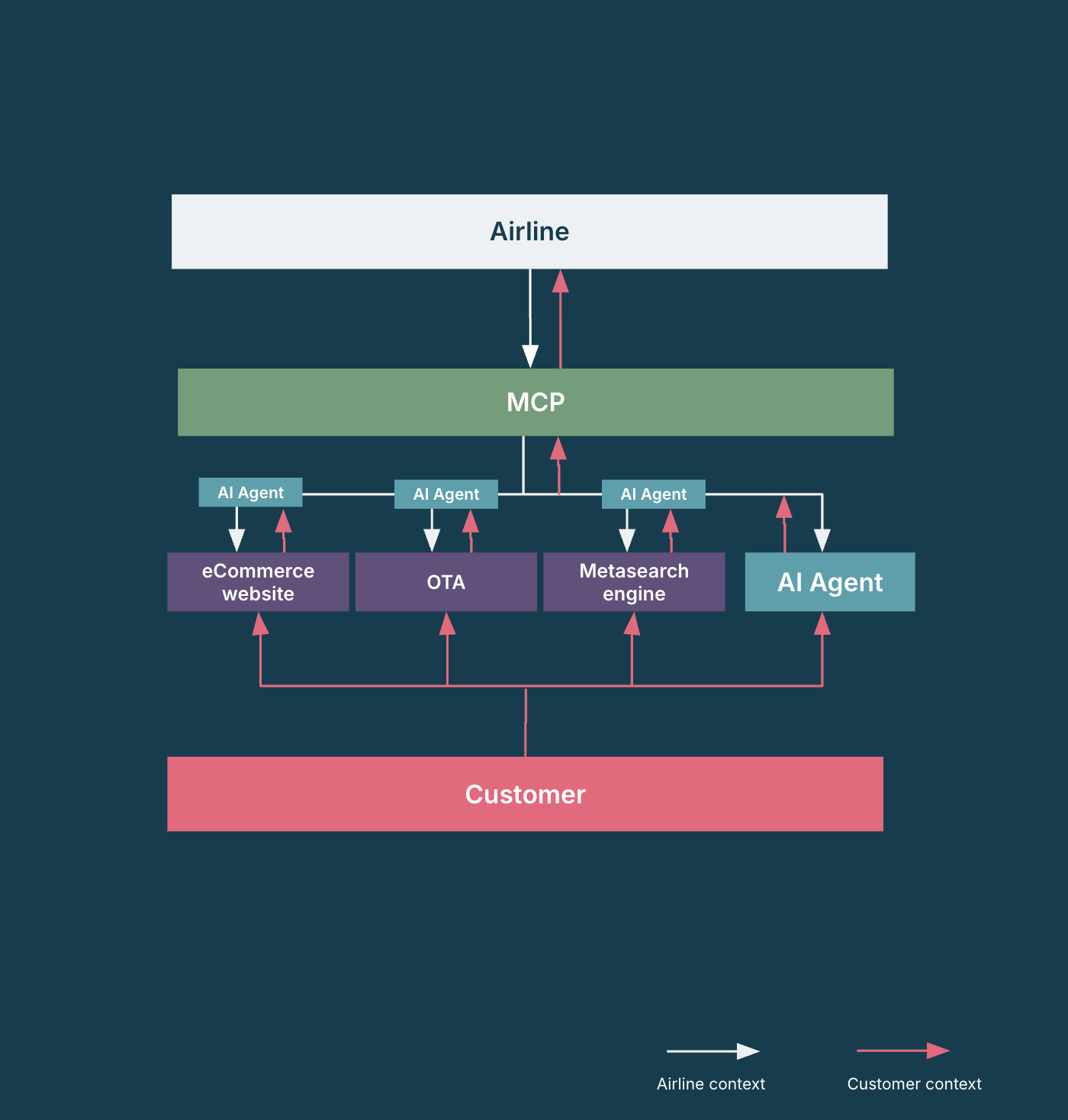Airlines are at a crossroads. The move from static fare families to dynamic offers is transforming the traveler experience. Meanwhile, customers expect more personalization and context, thanks to innovations in other industries. Now, a new shift is underway: AI-powered shopping agents are reshaping how trips get planned, evaluated and booked.
These AI agents go beyond assistance. They act as extensions of the traveler, autonomously executing tasks while precisely reflecting the person's values, preferences and constraints.
This changes everything. The digital storefront isn’t just a website or app anymore. It now includes everything from personal consumer agents to complex AI systems orchestrating searches and bookings across multiple channels.
The challenge? Airlines must now serve not just travelers but their intelligent agents too.
That’s where the Model Context Protocol (MCP) comes in. It helps airlines’ direct channels communicate clearly with AI agents, enabling competition through transparency, clarity, and relevance in every interaction.
MCP strategic insights: Channel shift in airline retailing
MCP isn’t just tech; it’s a competitive edge. Airlines have long sought direct, scalable, cost-effective distribution. MCP makes that possible by making content easier for AI agents to understand and act on.
Crucially, these agents serve the traveler’s intent. They are not acting independently; they reflect a shopper’s real-world values, constraints and goals. Airlines that recognize and align with this human-centered logic will win trust and bookings.
Content from online travel agencies (OTA) and global distribution systems (GDS) will remain, but AI agents blend sources dynamically. When direct channels offer richer, clearer content, they become the preferred choice. Not through marketing, but relevance.


MCP also supports generative engine optimization (GEO), the next evolution beyond SEO. GEO makes structured content discoverable and usable in AI-generated responses. MCP ensures airline content is machine-readable, explainable and well-structured — the kind of content AI agents prioritize.
The result is a level playing field where airlines with clearer, more relevant offers win on merit, not legacy.
Real-world comparison: Shopping without vs. with MCP
| Experience A: Maya uses an OTA | Experience B: Maya uses an AI agent |
| Maya is planning a trip from Boston to London. She prefers extra legroom, flexible dates and low baggage fees. She visits a popular OTA and inputs her search criteria. | Maya asks her AI assistant: “Help me book a flight to London around the 15th. I usually fly Airline X. I’d like extra legroom, low baggage fees and no airport stress.” |
Decision-making process:
|
Decision-making process:
|
Results:
|
Results:
Maya chooses Airline X. Her agent books the ticket seamlessly. |
From the airline’s perspective:
|
From Airline X’s perspective:
|
In this head-to-head, the airline using MCP didn’t just secure the booking — it achieved advantages with impact well beyond a single transaction:
1. The MCP equipped offer won in a competitive, multi-channel environment.
2. No distribution fees were paid.
3. The airline gained rich context not possible without MCP into Maya’s preferences and reasoning.
Meanwhile, airlines not using MCP were simply “seen but not selected,” with little control over content presentation and no insight into the lost sale.
Why Model Context Protocol matters: Top 3 airline use cases
1. Dynamic offer optimization
MCP empowers airlines to deliver dynamic offers aligned with real-time traveler context. Intelligent agents gain access to structured metadata, enabling them to evaluate not just the price, but the “why” behind each offer. This increases the chances of conversion.
2. Transparent, explainable shopping
Travelers and their agents expect to understand the rationale behind recommendations. MCP supports this by making offer logic explicit. Trust is built through clarity, not mystery.
3. Personalized, consistent experiences
MCP enables a shared semantic framework that different systems can use to interpret traveler context. Whether a booking starts in an airline app, a metasearch engine or through an AI assistant, the experience remains coherent. Travelers receive relevant offers regardless of where they shop.
MCP benefits for airlines: Strategic and revenue impact
Airlines that implement MCP will see:
Higher conversion rates driven by more relevant offers that are easier for agents to interpret and explain.
Lower distribution costs through greater reliance on direct, machine-readable channels.
Improved operational efficiency as redundant logic and manual exception handling are eliminated.
Greater customer satisfaction as offers align with the traveler’s intent and preferences.
Stronger loyalty and repeat business by meeting expectations across touchpoints and interactions.
Increased ancillary revenue through context-aware upselling opportunities.
A roadmap to MCP implementation in airlines
To begin reaping the benefits of MCP, airlines should prioritize enabling their direct channels for model-readable interactions. Key actions include:
Adopting an MCP schema for traveler context and offer logic.
Updating dynamic offer engines to interpret contextual inputs.
Publishing APIs that intelligent agents can query and understand.
Launching pilot projects with forward-leaning partners (e.g. AI agents or aggregators).
Early outcomes:
Direct content becomes MCP-compliant and visible to intelligent agents.
The airline gains first-mover advantage in AI-influenced shopping.
New sales are captured without waiting for full industry alignment.
From there, airlines can begin to rebalance distribution strategies. The long-term goal is a retailing model where intelligent agents prefer direct content, contextual relevance drives selection, and every offer is backed by clear rationale.
MCP: The critical next step for airline retail transformation
Airlines that adopt MCP position themselves to win in an AI-mediated travel market. They become more visible, more intelligible and more trusted, not just by intelligent agents, but by the human travelers those agents represent.
The agent may drive the interactions, but it’s still the traveler who chooses. MCP helps airlines speak clearly to that choice.
This is the channel shift airlines have wanted. MCP doesn’t just unlock it. It accelerates it.
Ready to redefine your airline’s retail experience? Discover how Thoughtworks can help you harness MCP to deliver personalized and dynamic offers. Connect with our experts today.
Disclaimer: The statements and opinions expressed in this article are those of the author(s) and do not necessarily reflect the positions of Thoughtworks.


















